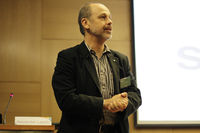Alexander Laszlo: Difference between revisions
Charikleia (talk | contribs) No edit summary |
Charikleia (talk | contribs) No edit summary |
||
| Line 19: | Line 19: | ||
<tr> | <tr> | ||
<td width=" | <td width="50%" align="left" valign="top">__TOC__</td> | ||
<td valign="top" width="70%" | <td valign="top" width="70%"><br><br><br><br><br><br><br><br><br>{{#ev:youtube| HLXE8VvCnpw| 250 |left|Alexander Laszlo's thoughts on Reinventing Democracy}}</td> | ||
<table> | <table> | ||
Revision as of 09:52, 31 October 2016
|
Alexander Laszlo (born 1964) an American systems scientist, Director of Leadership and Systemic Innovation PhD program at the Buenos Aires Institute of Technology, President of Syntony Quest, and faculty member for the Organizational Systems Renewal program at Bainbridge Graduate Institute in Seattle, Washington.[1] He was President of the International Society for the Systems Sciences in 2012-13, known for his work on systems theories[2] and "knowledge management in a changing world."[3]
Biography
Alexander Laszlo is the son of Ervin László, and was born in Fribourg, Switzerland. He received a BA from Haverford College, with a major in International and Comparative Political Science and a minor in Human Physiology. At the University of Pennsylvania he received his MA in History and Sociology of Science, and a PhD in the interdisciplinary field of Science and Technology Policy.
He has been faculty member of both the MBA in Sustainable Business at Bainbridge Graduate Institute and the MBA in Sustainable Management at the Presidio School of Management since the first year of operation of each program. Laszlo now serves as Adjunct Faculty in the MBA in Sustainable Entrepreneurship program of the Green MBA at Dominican University, in the Leadership of Sustainable Systems program at both the Master’s and Doctoral levels at Saybrook Graduate School & Research Center, and on the Scientific Advisory Board of the Center for Advanced Study at the Giordano Bruno GlobalShift University.
He has worked for the UNESCO Regional Office for Science & Technology for Europe, the Italian Electric Power Agency, and the Office of Postsecondary Education of the U.S. Department of Education. He has held visiting appointments with the London School of Economics and the European University Institute, and has been named a Level I Member of the National Research Academy of Mexico (SNI).
He is on the Editorial Boards of Systems Research & Behavioral Science,[4] World Futures,[5] and Organisational Transformation & Social Change.[6] An active member of several systems science societies, among them Co-Chair of Evolutionary Development SIG at International Society for the Systems Sciences (ISSS),[7] Alexander Laszlo is author of over fifty journal, book, and encyclopedia publications, with A Field Guide for Evolutionary Leaders forthcoming.
Alexander Laszlo is the recipient of the Gertrude Albert Heller Award, the Sir Geoffrey Vickers Memorial Award, as well as of the Förderpreis Akademischer Klub award of the University of St. Gallen, Switzerland, for work in social innovation and sustainable development, and finalist for the 2003 Beyond Gray Pinstripes award of the World Resources Institute and the Aspen Institute for educational work in sustainable business.[8][9]
He is also Head Instructor of the Dojang At Occidental (the DAO) with over 25 years of experience. He holds a 5th Degree Black Belt in Chung Do Kwan style of Tae Kwon Do and a 2nd Degree Black Belt in Shotokan style of Karate.[10]
Work
Laszlo applies in his research, teachings and practice systems thinking, policy analysis, and technology assessment to issues of individual and collective empowerment, and community-building activities on the design and implementation of evolutionary pathways for self-directed sustainability. Laszlo teaches on evolutionary leadership, collaboration, and systems thinking at a variety of MBA and Doctoral programs internationally.
Reinventing Democracy
He believes that the issue of reinventing democracy in the digital era is of a critical importance. The issues around democracy are issues about participation and engagement in civic life and fundamental issues of how we create meaning together. How we use technology to connect us to life is for him a critical question for participatory and civic engagement.
As he suggests, there are four levels to this challenge, which can lead us through technologies to ways that can connect us in a true participatory reinvention of democracy.
1. How we use technology to bring meaning into our own personal life in the context of our interactions in community (Intra-personal level of democratic life of participation in a civic society)
2. Engaging with others and making decisions together (Inter-personal level of democratic life of participation in a civic society)
3. How do we connect and make decisions in ways that are inculusive of other forms of life. Trees, plans, animals, they are active members with us in the co-creation of meaning. (Trans-species level of democratic life of participation in a civic society)
4. How do we engage in dialogue with our ancestors and future generations – how do we engage them in the narrative in a participatory way that prepares and anticipates questions and opportunities for future generations and carries forward the narratives and ideas of participation from previous generations.
Selected publications
- Laszlo, Alexander, and Kathia Castro. "Technology and Values: Interactive Learning Environments for Future Generations." Educational Technology 35.2 (1995): 7-13.
- Laszlo, Ervin, and Alexander Laszlo. "The contribution of the systems sciences to the humanities." Systems Research and Behavioral Science 14.1 (1997): 5-19.
- Laszlo, Alexander, and Stanley Krippner. "Systems theories: Their origins, foundations, and development." ADVANCES IN PSYCHOLOGY-AMSTERDAM- 126 (1998): 47-76.
- Laszlo, Alexander. "The epistemological foundations of evolutionary systems design." Systems Research and Behavioral Science 18.4 (2001): 307-321.
- Castro Laszlo, Kathia, and Alexander Laszlo. "Evolving knowledge for development: the role of knowledge management in a changing world." Journal of Knowledge Management 6.4 (2002): 400-412.
- Laszlo, A., and Ervin László. "The systems sciences in service of humanity." Encyclopedia of Life Support Systems (EOLSS), F. Parra-Luna,(Ed.). EOLSS Publishers, Oxford, UK (2003).
- Laszlo, Alexander. "Evolutionary Systems Design." Journal of Organisational Transformation & Social Change 1.1 (2004): 29-46.
- Laszlo, Kathia Castro, and Alexander Laszlo. "Fostering a sustainable learning society through knowledge‐based development." Systems Research and Behavioral Science 24.5 (2007): 493-503.
- Laszlo, Alexander, Kathia Castro Laszlo, and Halim Dunsky. "Redefining success: designing systemic sustainable strategies." Systems Research and Behavioral Science 27.1 (2010): 3-21.
References
- ↑ http://www.bgi.edu/academics/our-faculty/ Bainbridge Graduate Institute in Seattle, Washington, Faculty]
- ↑ Werhane, Patricia H. "Moral imagination and systems thinking." Journal of Business Ethics 38.1-2 (2002): 33-42.
- ↑ Ergazakis, Kostas, Kostas Metaxiotis, and John Psarras. "Towards knowledge cities: conceptual analysis and success stories." Journal of knowledge management 8.5 (2004): 5-15.
- ↑ Template:Cite web
- ↑ Template:Cite web
- ↑ Template:Cite web
- ↑ Template:Cite web
- ↑ Template:Cite web
- ↑ Template:Cite web
- ↑ Template:Cite web
External links
- Syntony Quest, a social profit educational organization.
- Giordano Bruno Global Shift University
Template:International Society for the Systems Sciences Presidents

